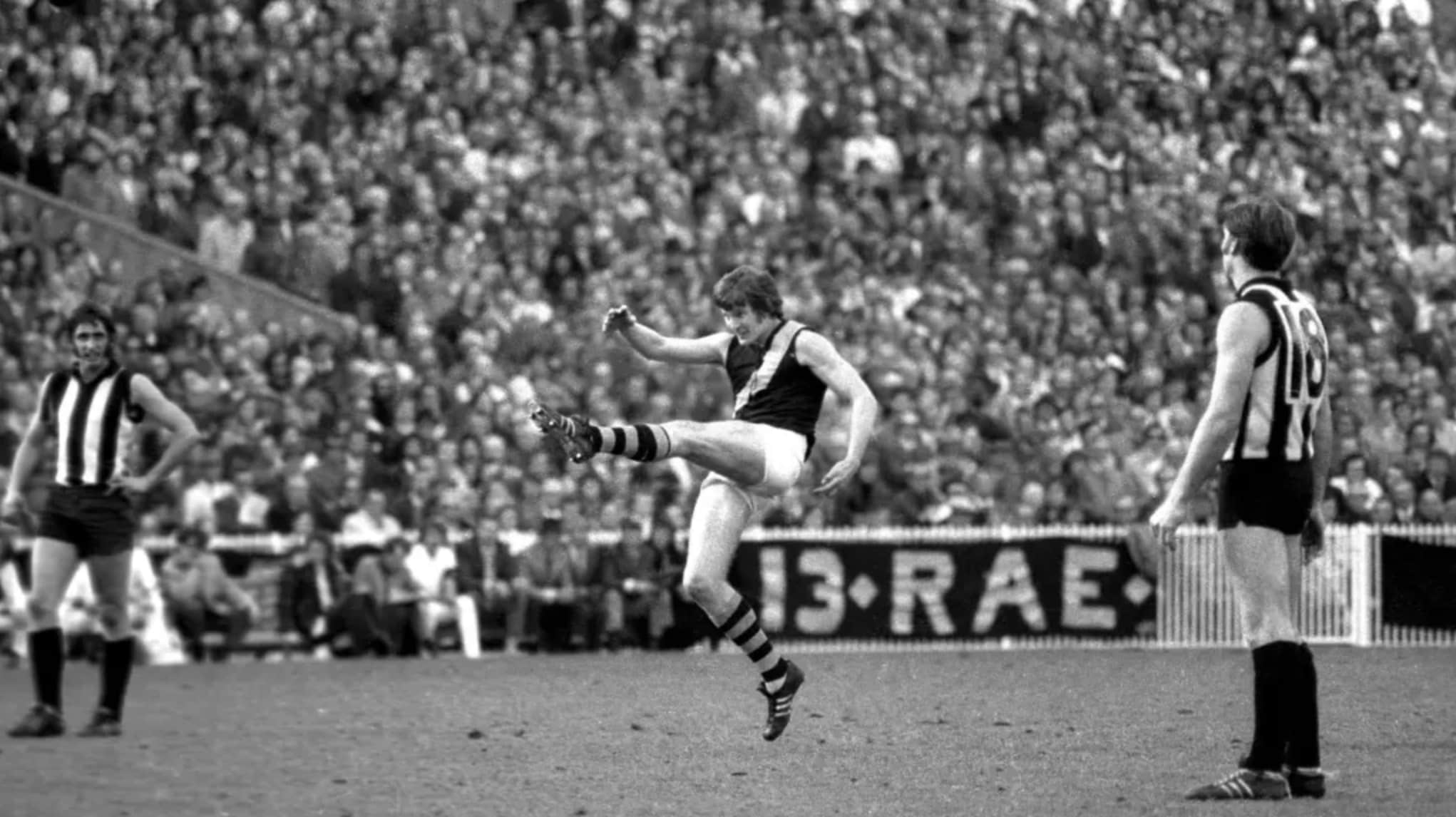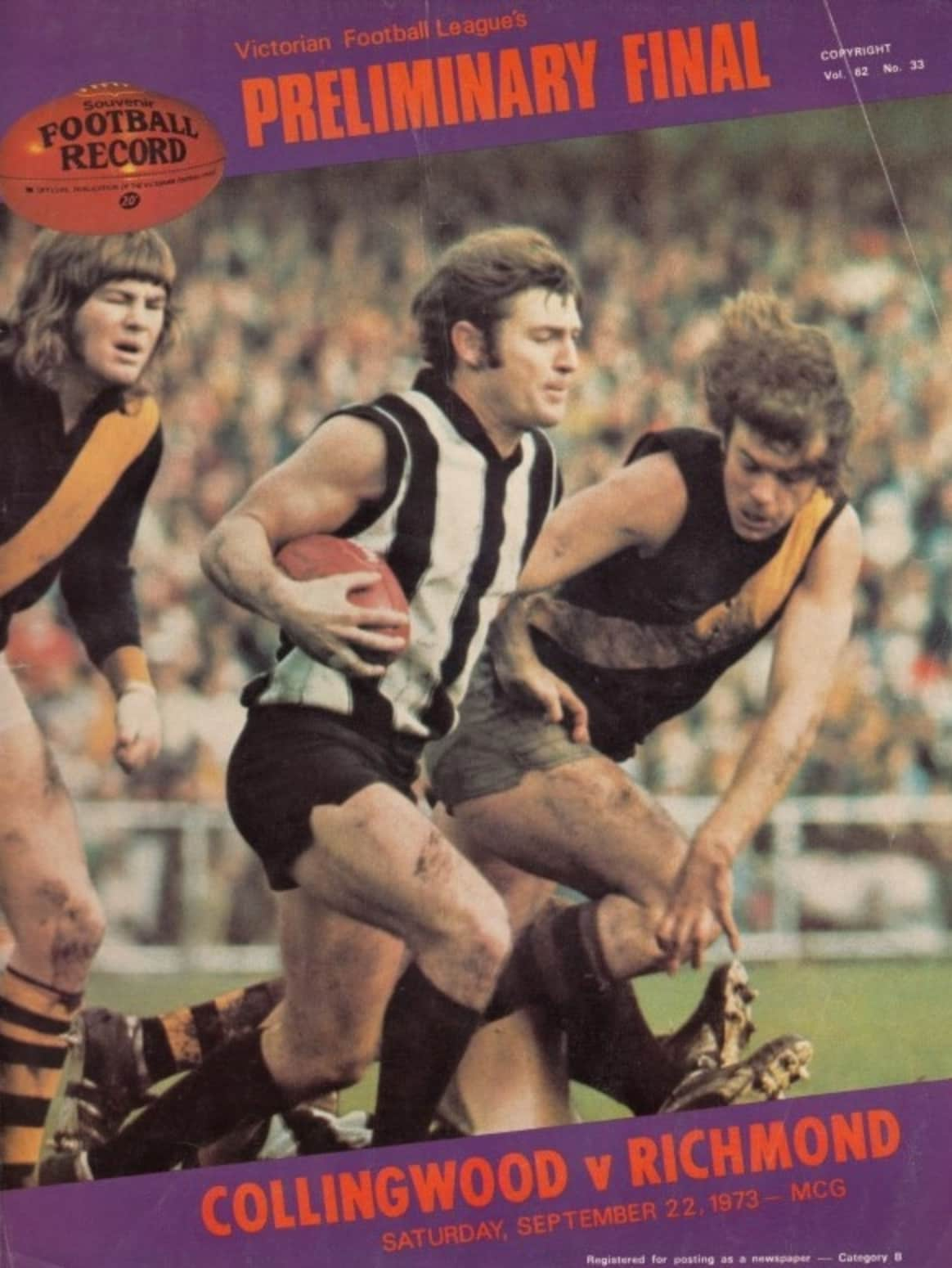Preliminary final week, for me, always evokes wonderful memories of one of the greatest Richmond wins I have ever seen . . .
It was the preliminary final of 1973, against traditional rival, Collingwood, in front of a crowd of 98,652 at the MCG.
The Tigers trailed by as much as 45 points, at one stage during the second quarter, before staging a mighty, fighting comeback, to snatch an incredible victory.
That success gave Richmond another crack at Carlton, in the 1973 Grand Final, and a chance to avenge the bitter disappointment of the loss to the Blues in the premiership-decider the previous year.
The Tigers finished the '73 home-and-away season in second place on the ladder with a 17-5 record. Collingwood had finished top with a 19-3 record, while Carlton was third with a 15-7 record.
In the first week of the '73 finals series, Carlton 13.13 (91) defeated Richmond 10.11 (71) in the qualifying final, while Collingwood gained automatic entry into the second semi-final by virtue of finishing top of the ladder. But in the second semi, the Magpies 12.15 (87) lost to Carlton 15.17 (107).
That set up a do-or-die preliminary final clash between Richmond and Collingwood for the right to meet Carlton in the big one the following week.
Intrigue surrounded the lead-up to the penultimate match of the '73 season, with champion Tiger centre half-forward and captain, Royce Hart, under a major injury cloud with a knee problem and considered more than likely to miss.
At the last minute, however, Richmond named Hart as 19th man in the line-up, as insurance, just in case something went drastically wrong and he was required to come off the bench to provide his customary inspiration.
It turned out to be the best insurance policy ever underwritten at Punt Road . . .

Richmond's Royce Hart kicks for goal. Source: Fairfax Images
Royce, the idol of the Yellow and Black hordes, was summoned into the fray after spending the first half on the pine, with the Tigers trailing by six goals at the long break and seemingly shot.
Here's how Mike Worner, writing in the Sunday Observer, the day after the '73 preliminary final, saw the Hart drama unfold . . .
"At 1.30 yesterday afternoon Richmond captain Royce Hart offered his services to coach Tom Hafey.
"I wasn't going to have him sitting in the grandstand if he could be of value to us, so he went on the bench," Hafey said.
At 3.30, during the half-time break, Robert Lamb was replaced and the magical Mr Hart took over at centre half-forward.
At 5.30, he was talking about Richmond's star-studded seven-point second half steal of the preliminary final from Collingwood.
It was two quarters of Hart-Balme that lifted Richmond into the Grand Final for the second year in-a-row.
Hart, bubbling with confidence despite his troublesome knee, turned Lee Adamson's fairytale first half into a second half horror story.
Memories must have come flooding back for Jeff Clifton as his last half against Neil Balme also turned sour.
Balme actually began his five-goal run just before half-time when he took a mark in the goal square.
It had been awfully quiet for him, and all the Richmond forwards up to that stage.
The Collingwood backs, going in as they had never gone in before, gave the Tiger tails an uncomfortable pull.
"Our first half must have sapped all our energy. I believe we were not as physically strong as Richmond," a despondent Collingwood captain Wayne Richardson said after the game.
The game was almost a replica of the 1970 Grand Final when Carlton turned on a trail-blazing second half.
"Once again we walk away from the MCG disappointed," coach Neil Mann told his gloomy supporters and players.
Other than the Hart-Balme combination, Hafey made other moves that turned the tide.
Wayne Walsh went to the centre and the strangely ineffective Ian Stewart went to a half-forward flank, Robert McGhie went onto Thompson at centre half-forward, Dick Clay returned to full-back and Francis Bourke began the third quarter on a half-back flank.
Bourke found his feet in defence, Walsh started to collect kicks and Len Thompson languished.
The Thompson-Jenkin switch just before the ball was bounced gave the start of the match some added drama.
It worked perfectly as Jenkin, playing like a man possessed, marked and tapped his way to stardom.
Thompson, using pace and height, was more than a handful for the tentative Bourke.
Collingwood rover George Bisset, the best man on the ground, was everywhere. Again, it was only in part two of the match, that Kevin Bartlett and Paul Sproule became an influence.
With Paul Cranage, Lee Adamson and Daryl Salmon also on top, Collingwood raced away.
But once Hafey had made his half-time changes and the Richmond pace, strength and skill began to tell, Collingwood began that tumble to obscurity.
They actually lost the lead for the first time in the match when Richmond levelled the scores at the nine-minute mark in the final term.
The Magpies refused to say goodbye and Alan Holmes kicked a gutsy goal to give them back the lead.
Then, minutes into the quarter, the Tigers hit the front for the first time when Bartlett goaled.
At that point some spectators, sensing the usual Collingwood "always the bridesmaid" role, began to leave."
Coaching legend, Ron Barassi, also writing in the Sunday Observer, pulled no punches with his assessment why the Tigers had emerged triumphant . . .
"Richmond won because they have matchwinners in their side . . . Collingwood lost because they have none.
The Magpies, when picking themselves up off the floor during the summer, should look at the fact that they do not have a real matchwinner.
The matchwinning player is not the man who gets three votes just because he has played well all day.
He is one who can rise to the occasion no matter what the opposition throws at him under pressure, or no matter how tense the circumstances -- like Neil Balme of Richmond.
Collingwood have plenty of players who turn in a steady, fairly high class game. But sometimes a bit more than that is needed.
Call it magic if you like, but certainly this matchwinning ingredient is a vital substance in finals.
This was the tale of yesterday's final. Collingwood, in the first half, played like a finals team should. They were well adjusted mentally, played desperate football with heavy body contact, made courageous smothers and showed an aggressive streak in every player.
The only question at half-time was whether the Magpies would keep up the pressure.
With the presence of Hart and the improved form of Balme and Bartlett, Richmond fought back brilliantly, and when the chips were down late in the last quarter, it was Richmond who produced the matchwinners . . .
Richmond made a fantastic fightback in the second half and it was a tribute to their fitness and confidence.
Both teams indulged in an arm wrestle, tight battle after the half-time break with Richmond's hand slowly, but surely, pushing the Magpies' mitt into the turf.
That was real pressure . . ."
Chief football writer of 'The Herald', Alf Brown (the doyen of football scribes), was lavish in his praise of Richmond's stirring fightback . . .
"Richmond, with the greatest comeback I have seen in a final series, beat Collingwood in the preliminary final at the MCG this afternoon. They will play Carlton in the Grand Final next Saturday.
Richmond were 45 points behind in the second quarter and did not appear to have a chance of winning. But a reshuffled and revitalised side helped them to turn on a superb winning second half.
Collingwood tired badly after half-time – especially big men like Thompson and Jenkin, who had given them great drive early.
Collingwood's fadeout was reminiscent of the Grand Final in 1970. Carlton were 44 points down at half-time, but got up to win.
Richmond rover Kevin Bartlett was a great player. In the first half he roved to a losing ruck, but got kicks. In the second half he improved his game, kicked more accurately and got two of Richmond's last three goals to clinch the match.
In the first half, Collingwood upset Richmond with tactics. Their playing of Thompson at centre half-forward looked like a matchwinning move. And Jenkin in the ruck was rarely beaten.
But it was all Richmond after half-time. They swung 19th man Royce Hart to centre half-forward, Brownlow Medal winner Ian Stewart, who had done well in the centre, to a half-forward flank, and the Tigers were on their way to another Grand Final."
Match details
Richmond 2.2 4.7 10.13 15.15 (105)
Collingwood 6.7 10.7 12.9 14.14 (98)
Goals – Richmond: Balme 5, Bartlett 3, Stewart 2, Hart 2, Carter, Roberts, Sproule.
Collingwood: Kink 3, Atkinson 3, Thompson 3, M. Richardson 2, Heard 2, Holmes.
Best – Richmond: Bartlett, Keane, Walsh, Sheedy, Balme, Bourke.
Collingwood: Bisset, Dean, Jenkin, W. Richardson, Cranage, Holmes.
Richmond player stats from the '73 preliminary final
No. 2. Ian Stewart: 12 kicks, 2 handballs, 3 marks
No. 5. Rex Hunt: 9 kicks, 0 handballs, 1 mark
No. 6. Paul Sproule: 12 kicks, 5 handballs, 2 marks
No. 7. Wayne Walsh: 14 kicks, 3 handballs, 2 marks
No. 8. Dick Clay: 7 kicks, 0 handballs, 1 mark
No. 10. Kevin Sheedy: 16 kicks, 12 handballs, 5 marks
No. 11. Laurie Fowler: 10 kicks, 3 handballs, 6 marks
No. 12. Robert McGhie: 8 kicks, 1 handball, 3 marks
No. 13. Stephen Rae: 6 kicks, 4 handballs, 1 mark
No. 15. Brian Roberts: 10 kicks, 3 handballs, 7 marks
No. 16. Bryan Wood: 14 kicks, 5 handballs, 2 marks
No. 21. Neil Balme: 11 kicks, 0 handballs, 7 marks
No. 22. Robert Lamb: 2 kicks, 0 handballs, 1 mark
No. 27. Noel Carter: 9 kicks, 0 handballs, 1 mark
No. 29. Kevin Bartlett: 23 kicks, 2 handballs, 3 marks
No. 30. Francis Bourke: 16 kicks, 6 handballs, 7 marks
No. 37. Michael Green: 2 kicks, 3 handballs, 1 mark
No. 40. Mervyn Keane: 16 kicks, 4 handballs, 2 marks
No. 4. Royce Hart (19th man): 5 kicks, 0 handballs, 2 marks
No. 9. C. McKellar (20th man): 0 kicks, 0 handballs, 0 marks
TOTALS: 202 kicks, 53 handballs, 57 marks



